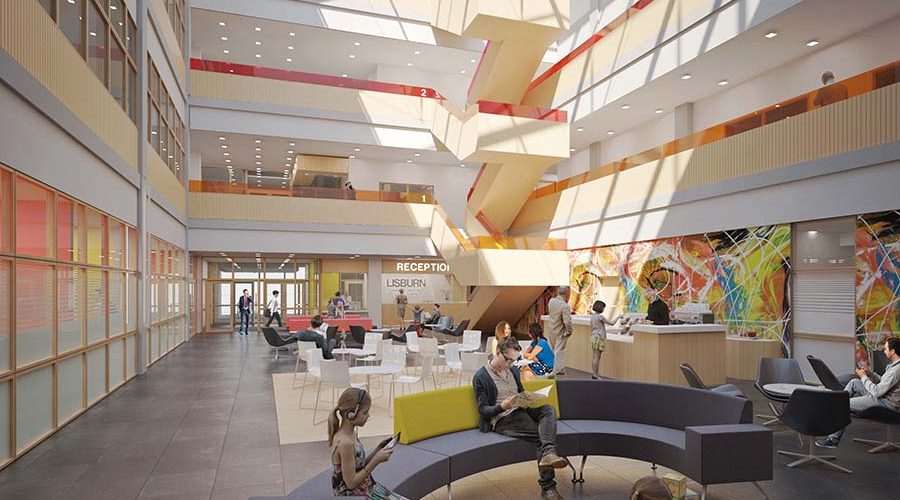Kirk Taylor, Head of Development at Kajima Partnerships, believes those working across construction and public sector building programmes need to help NHS managers find a way to expand capacity by looking to innovative solutions, such as modular construction.
Kajima Partnerships
With scientists and public health experts now warning that the United Kingdom could face a second and more deadly wave of COVID-19 this winter, the £3bn in additional funding announced by the Prime Minister to help the NHS cope with its exacerbated winter pressures is very welcome news indeed.
Quite rightly, the money will be made available immediately and will allow the NHS to continue using additional private hospital capacity and maintain the temporary NHS Nightingale hospitals until the end of March next year. This will provide additional capacity for coronavirus patients, and will play a vital role in preventing the worst-case scenario of 120,000 excess deaths.
However, whilst resources must of course continue to be devoted to tackling the pandemic, I believe that decision makers must also consider how best to get other key services back on track. And there are compelling numbers for them to do so.
The challenge beyond the virus
NHS staff have done a fantastic job of treating an overwhelming number of COVID-19 patients in recent months. Health service workers have literally put their lives on the line and coped with unprecedented pressures.
But whilst the NHS has obviously done everything it can with the resources and priorities it was given, the strain caused by the virus and subsequent lockdown measures has resulted in various other NHS services coming under tremendous strain also.
Indeed, despite referrals initially falling – due, in large part, to fewer people seeking treatment as many wanted to avoid hospitals in the middle of a pandemic – it is feared that waiting lists for routine surgeries could double to 10 million people by the end of the year.
Subsequently, NHS England has estimated that waiting times – which are typically up to a maximum of 18 weeks – are instead likely to increase “significantly” in the second half of this year.
More worryingly still, a UK Government report published in April suggested that delays to treatment could result in up to 210,000 deaths. Likewise, with cancer-related referrals in May showing a 47% year-on-year decline, it is feared that diagnosis delays could cost an additional 35,000 lives.
In other words, it is evident that there is an urgent need to expand the capacity of these NHS services and many others, or else we risk simply redirecting COVID-19-related deaths elsewhere.
A modular solution
None of this is the NHS’ fault. This is why I believe those of us working across construction and public sector building programmes need to help NHS managers find a way to expand capacity, including operating theatres, rapid diagnostic centres and additional wards. The first priority should be to find ways to clear the backlog of patients requiring vital services.
The good news is that a range of measures have started to be undertaken in order to do so, including the aforementioned greater use of private sector facilities and the repurposing of some of the Nightingale hospitals. Other novel solutions, such as mobile vaccination centres in shipping containers might sound unconventional, but would also allow many NHS facilities to return to their normal day-to-day purposes.
However, the scale of additional capacity required – and the ongoing need to ensure that new facilities can accommodate social distancing and new infection control procedures – inevitably means that as a country we will have to physically construct new services.
And if we are to do that at speed and at scale, then I would contend that we must look to expedited procurement routes and alternative, faster and more cost-effective solutions such as offsite modular construction.
Indeed, one of the great benefits of modular construction projects is that with various components manufactured off-site, activities such as site works and manufacturing can run in parallel, therefore, allowing significant reductions in the period from initial inception to doors opening.
That is a huge saving in time, that could help provide patients with faster access to the services they need right now, which, in turn, can generate savings across the health economy.
Equally as important are the internal decision processes of NHS Trusts. Rather than each Trust pursuing its own decision and procurement routes, NHS England could take a lead and “type approve” specific solutions for areas such as diagnostic suites and elective facilities. With central approval, individual Trusts could then procure facilities to meet immediate need, rather than going through an individual approval process, which in many cases can take as long as the time required to construct the facility itself.
Brave new thinking is needed to respond to the challenges ahead. And again, at a time when the public finances are stretched, these types of efficiencies would allow NHS budgets to go even further than they otherwise would.
The NHS of the future
The NHS Nightingale hospitals, which provided vital extra capacity in just nine days, have already demonstrated the speed at which new facilities can be created if we put our minds to it.
But we are now fighting a war on two fronts: we need to keep working to defeat the pandemic, whilst also scaling up and restoring to health other key services.
That is why I believe we must look to innovative solutions such as modular construction to expand capacity further – not only to support the NHS of today, but to help build the NHS of the future.









